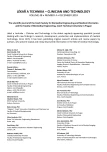-
Články
- Vzdělávání
- Časopisy
Top články
Nové číslo
- Témata
- Kongresy
- Videa
- Podcasty
Nové podcasty
Reklama- Kariéra
Doporučené pozice
Reklama- Praxe
Computer-aided modeling and additive manufacturing fabrication of patient-specific mandibular implant
Autoři: Mario Sokac; Igor Budak; Dajana Miljanovic; Zeljko Santosi; Djordje Vukelic
Působiště autorů: Faculty of Technical Sciences, University of Novi Sad, Novi Sad, Serbia
Vyšlo v časopise: Lékař a technika - Clinician and Technology No. 4, 2018, 48, 113-117
Kategorie: Original research
Souhrn
With the recent advances in computer-aided technologies and their breach into the medical field, there can be seen more and more successful outcomes, especially in the files of reconstructive prosthetic surgery. With the application of advanced tools for reconstruction of complex shape such as human anatomy, it allowed accurate and fast design of complex implants as a substitution for deformed or damaged regions in the field of maxillofacial surgery. Design, in compliance with application of additive manufacturing (AM) technologies, is starting to gain more recognition as a tool for fast and accurate delivery of patient-specific 3D implants. This paper present a case study where such 3D technologies are used to design and fabricate a patient-specific mandibular implant. Tools for design of complex anatomical surfaces, such as mandible are presented and demonstrated in this paper. As the verification stage, AM technologies are used for visual inspection and surgical procedure planning of the designed 3D model of the mandibular implant.
Klíčová slova:
computer-aided modeling – design – mandibular implant – additive manufacturing (AM) technologies
Zdroje
[1] Pacifici, L., De Angelis, F., Orefici, A., Cielo, A.: Metals used in maxillofacial surgery. Oral and Implantology, 2016, vol. 9, no. 2, pp. 107–111.
[2] Zhou, L., Shang, H., He, L., Bo, B., Liu, G. Liu, J., Zhao, J.: Accurate reconstruction of discontinuous mandible using a reverse engineering/computer-aided design/rapid prototyping technique: A pre-liminary clinical study. Journal of Oral and Maxillofacial Surgery, 2010, vol. 68, no. 9, pp. 2115–2121.
[3] Goh, B. T., Lee, S., Tideman, H., Stoelinga, P. J. W.: Mandibular reconstruction in adults: a review. International Journal of Oral and Maxillofacial Surgery, 2008, vol. 37, no. 7, pp. 597–605.
[4] Cohen, A., Laviv, A., Berman, P., Nashef, R., Abu-Tair, J.: Mandibular reconstruction using stereo-lithographic 3-dimensional printing modeling technology. Oral Surgery, Oral Medicine, Oral Pa-thology, Oral Radiology and Endodontology, 2009, vol. 108, no. 5, pp. 661–666.
[5] Stoor, P., Suomalainen, A., Mesimäki, K., Kontio, R.: Rapid prototyped patient specific guiding implants in critical mandibular reconstruction. Journal of Cranio-Maxillofacial Surgery, 2017, vol. 45, no. 1, pp. 63–70.
[6] Schwaiger, M., Wallner, J., Pau, M., Feichtinger, M., Zrnc, T., Zemann, W., Metzler, P.: Clinical experi-ence with a novel structure designed bridging plate system for segmental mandibular reconstruction: The TriLock bridging plate. Journal of Cranio-Maxillofacial Surgery, 2018, vol. 46, no. 9, pp. 1679–1690.
[7] Naros, A., Weise, H., Tilsen, F., Hoefert, S., Naros, G., Krimmel, M., Reinert, S., Polligkeit, J.: Three-dimensional accuracy of mandibular reconstruction by patient-specific pre-bent reconstruction plates using an ‘in-house’ 3D-printer. Journal of Cranio-Maxillofacial Surgery, 2018, vol. 46, no. 9, pp. 1645–1651.
[8] Singare, S., Lian, Q., Wang, W., Wang, J., Liu, Y., Li, D., Li, B.: Rapid prototyping assisted surgery planning and custom implant design. Rapid Prototyping Journal, 2009, vol. 15, no. 1, pp. 19–23.
[9] Nasr, E. A., Al-Ahmari, A., Kamrani, A., Moiduddin, K.: Digital design and fabrication of customized mandible implant. World Automation Congress Proceedings, 2014, pp. 1–6.
[10] Parthasarathy, J.: 3D modeling, custom implants and its future perspectives in craniofacial surgery. Annals of Maxillofacial Surgery, 2014, vol. 4, no. 1, pp. 9–18.
[11] Deeb, G., Allen, R., Hall, V., Whitley, D., Laskin, D., Bencharit, S.: How Accurate Are Implant Surgical Guides Produced With Desktop Stereo-lithographic 3-Dimentional Printers?. Journal of Oral and Maxillofacial Surgery, 2017, vol. 75, no. 12, p. 2559.e1-2559.e8.
[12] Salmi, M., Paloheimo, K., Tuomi, J., Wolff, J., Mäkitie, A.: Accuracy of medical models made by additive manufacturing (rapid manufacturing). Journal of Cranio-Maxillofacial Surgery, 2013, vol. 41, no. 7, pp. 603–609.
[13] Budak, I., Mirkovic, S., Sokac, M., Santosi, Z., Puskar, T., Vukelic, D.: An approach to modelling of personalized bone grafts based on advanced technologies. International Journal of Simulation Modelling, 2016, vol. 15, no. 4, pp. 637–648.
[14] Mirković, S., Budak, I., Puškar, T., Tadić, A., Šokac, M., Santoši, Ž., Djurdjević-Mirković, T.: Application of modern computer-aided technol-ogies in the production of individual bone graft: A case report. Vojnosanitetski Pregled, 2015, vol. 72, no. 12, pp. 1126–1131.
[15] Šokac, M., Budak, I., Mirković, S., Santoši, Ž., Movrin, D., Puškar, T.: The role of advanced 3D technologies and additive manufacturing in designing and manufacturing of customized bone grafts. Journal for Technology of Plasticity, 2017, vol. 42, no. 2, pp. 33–44
Štítky
Biomedicína
Článek Nanofiber scent carrier
Článek vyšel v časopiseLékař a technika

2018 Číslo 4-
Všechny články tohoto čísla
- Computer-aided modeling and additive manufacturing fabrication of patient-specific mandibular implant
- Immediate effect of physical on blood flow velocity in radial artery in young adults
- Nanofiber scent carrier
- NANOFIBERS FROM POLYVINYL ALCOHOL AND CAN ENLARGE THE SET OF TRAPPED ODOROLOGICAL TRACES
- GLOBAL CENTERS OF MEDICAL DEVICE TECHNOLOGY: UNITED STATES, EUROPE AND CHINA
- Lékař a technika
- Archiv čísel
- Aktuální číslo
- Informace o časopisu
Nejčtenější v tomto čísle- GLOBAL CENTERS OF MEDICAL DEVICE TECHNOLOGY: UNITED STATES, EUROPE AND CHINA
- Computer-aided modeling and additive manufacturing fabrication of patient-specific mandibular implant
- Nanofiber scent carrier
- Immediate effect of physical on blood flow velocity in radial artery in young adults
Kurzy
Zvyšte si kvalifikaci online z pohodlí domova
Autoři: prof. MUDr. Vladimír Palička, CSc., Dr.h.c., doc. MUDr. Václav Vyskočil, Ph.D., MUDr. Petr Kasalický, CSc., MUDr. Jan Rosa, Ing. Pavel Havlík, Ing. Jan Adam, Hana Hejnová, DiS., Jana Křenková
Autoři: MUDr. Irena Krčmová, CSc.
Autoři: MDDr. Eleonóra Ivančová, PhD., MHA
Autoři: prof. MUDr. Eva Kubala Havrdová, DrSc.
Všechny kurzyPřihlášení#ADS_BOTTOM_SCRIPTS#Zapomenuté hesloZadejte e-mailovou adresu, se kterou jste vytvářel(a) účet, budou Vám na ni zaslány informace k nastavení nového hesla.
- Vzdělávání



